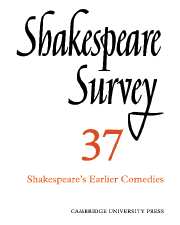Book contents
- Frontmatter
- Criticism of the Comedies up to The Merchant of Venice: 1953–82
- Plotting the Early Comedies: The Comedy of Errors, Love’s Labour’s Lost, The Two Gentlemen of Verona
- The Good Marriage of Katherine and Petruchio
- Shrewd and Kindly Farce
- Illustrations to A Midsummer Night’s Dream before 1920
- The Nature of Portia’s Victory: Turning to Men in The Merchant of Venice
- Nature’s Originals: Value in Shakespearian Pastoral
- 'Contrarieties agree': An Aspect of Dramatic Technique in Henry VI
- Falstaff’s Broken Voice
- ‘He who the sword of heaven will bear’: The Duke versus Angelo in Measure for Measure
- War and Sex in All’s Well That Ends Well
- Changing Places in Othello
- Prospero’s Lime Tree and the Pursuit of Vanitas
- Shakespearian Character Study to 1800
- How German is Shakespeare in Germany? Recent Trends in Criticism and Performance in West Germany
- Shakespeare Performances in Stratford upon–Avon–and London, 1982–3
- The Year's Contributions to Shakespearian Study 1 Critical Studies
- 2 Shakespeare’s Life, Times and Stage
- 3 Editions and Textual Studies
- Index
Criticism of the Comedies up to The Merchant of Venice: 1953–82
Published online by Cambridge University Press: 28 March 2007
- Frontmatter
- Criticism of the Comedies up to The Merchant of Venice: 1953–82
- Plotting the Early Comedies: The Comedy of Errors, Love’s Labour’s Lost, The Two Gentlemen of Verona
- The Good Marriage of Katherine and Petruchio
- Shrewd and Kindly Farce
- Illustrations to A Midsummer Night’s Dream before 1920
- The Nature of Portia’s Victory: Turning to Men in The Merchant of Venice
- Nature’s Originals: Value in Shakespearian Pastoral
- 'Contrarieties agree': An Aspect of Dramatic Technique in Henry VI
- Falstaff’s Broken Voice
- ‘He who the sword of heaven will bear’: The Duke versus Angelo in Measure for Measure
- War and Sex in All’s Well That Ends Well
- Changing Places in Othello
- Prospero’s Lime Tree and the Pursuit of Vanitas
- Shakespearian Character Study to 1800
- How German is Shakespeare in Germany? Recent Trends in Criticism and Performance in West Germany
- Shakespeare Performances in Stratford upon–Avon–and London, 1982–3
- The Year's Contributions to Shakespearian Study 1 Critical Studies
- 2 Shakespeare’s Life, Times and Stage
- 3 Editions and Textual Studies
- Index
Summary
Since John Russell Brown in 1955 surveyed criticism of Shakespearian comedy, there has been such a wealth of information and interpretation that the job of bringing his work up to date has had to be divided amongst contributors. M. M. Mahood in 1979 looked at ‘A Generation of Criticism’ on Much Ado About Nothing, As You Like It and Twelfth Night, whilst the present essay will cover the comedies leading up to this great trio. Obviously one cannot talk about the later plays without having an eye to the earlier, and Professor Mahood has made it unnecessary to attend to certain general aspects which the plays have in common. In the group examined here we have a couple of assured masterpieces and some plays which either have been or may become battlegrounds where ‘experimental’ approaches will fight for recognition. At first sight, however, the plays do not fall readily into a coherent grouping.
The Comedy of Errors, The Two Gentlemen of Verona, Love's Labour s Lost, The Taming of the Shrew, A Midsummer Night's Dream, The Merry Wives of Windsor, and The Merchant of Venice: a thoroughly professional, classical farce, a comic romance, a courtly entertainment, a robustly unsentimental marriage-play, a piece of faery mingled with courtly interlude, a genial glimpse of provincial life, and a dark,' problem' comedy which brings us close to death on the stage. Nothing much in common there, except the utter difference of each from its neighbour. Indeed, no other group of plays in the canon so firmly defies categorization, and all that the collection displays, if anything, is the dramatist's virtuoso control over a diversity of modes and materials loosely called 'comic'.
- Type
- Chapter
- Information
- Shakespeare Survey , pp. 1 - 12Publisher: Cambridge University PressPrint publication year: 1984

